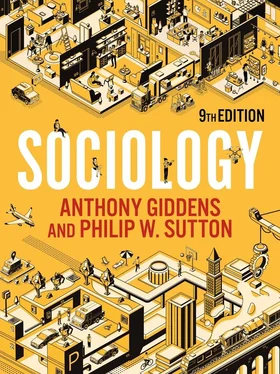Of course, people do not live their lives as isolated individuals, nor are their lives completely determined by large social structures. Sociology tells us that everyday life is lived in families, social groups, communities and neighbourhoods. At this level – the meso (or ‘middle’) level of society – it is possible to see the influence and effects of both micro- and macro-level phenomena. Many sociological studies of local communities deal with the macrosociological impact of huge social changes, such as economic restructuring, but they also explore the ways in which individuals, groups and social movements cope with such changes and turn them to their advantage.
For example, the 2008 financial crisis led to rising unemployment and falling living standards, but this also forced some people to learn new skills or start their own small businesses. Individuals are not simply at the mercy of large-scale social and economic changes but adapt creatively to them. Studying the community level of social life provides a window through which to observe the interaction of micro and macro levels of society. Much applied research (research with a practical aim) in sociology takes place at this meso level of social reality.
In later chapters, we will see further examples of how interaction in micro contexts affects larger social processes and how macro systems in turn influence more confined settings of social life. However, there remains one fundamental issue to be tackled in this chapter: what exactly is sociology for?
Sociology has practical implications for our lives, as C. Wright Mills emphasized when developing his concept of the sociological imagination. First, sociology gives us an awareness of cultural differences that allows us to see the social world from many perspectives. Quite often, if we properly understand how others live, we also acquire a better understanding of what their problems are. Practical policies that are not based on an informed awareness of the ways of life of people they affect have little chance of success. For example, a white English social worker operating in a predominantly Latin American community in South London will not gain the confidence of its members without being sensitive to the different experiences of ethnic groups in the UK.
Second, sociological research provides practical help in assessing the results of policy initiatives. A programme of practical reform may simply fail to achieve what its designers sought or may produce unintended consequences of an unfortunate kind. In the years following the Second World War, large public housing blocks were built in city centres in many countries. These aimed to provide high standards of accommodation for low-income groups from slum areas. However, research later showed that many people who had moved from their previous dwellings to large apartment blocks felt isolated and unhappy. High-rise apartment blocks often became dilapidated and provided breeding grounds for crime.
Third, many sociologists concern themselves directly with practical matters as professionals. People trained in sociology are to be found as industrial consultants, researchers in ‘think tanks’, urban planners, social workers and personnel managers, as well as in many other careers. An understanding of society and social relations can also be useful for future careers in law and criminal justice, journalism, business and the health professions.
Fourth, and in some ways most importantly, sociology can provide us all with self-enlightenment or increased self-understanding. The more we know about why we act as we do and about the overall workings of our society, the more likely we are to be able to influence our own future. Sociology does not just assist powerful groups or governments. The knowledge sociologists produce is made available to everyone and is often used by voluntary agencies, charities and social movements to bolster their case for change. However, sociological research findings, in themselves, are ‘neutral’. That is, they can tell us what society is like, how it ‘works’ and how it changes over time, but they cannot advise on whether it should be that way. That is the proper subject of competing political and moral debates that involve everyone.
Public and professional sociology
In recent years, some sociologists have argued that sociology has not engaged enough with the public and has concentrated too much on internal professional debates. In his presidential address to the annual meeting of the American Sociological Association in 2004, Michael Burawoy argued for a new ‘public sociology’ that would forge relationships with audiences beyond the narrow confines of universities. He maintains that the professionalization of sociology in the twentieth century was beneficial, but it also led to sociologists talking more to each other than to the public ‘out there’ (Burawoy 2005).
Burawoy says there are four types of sociology: professional sociology, policy sociology, critical sociology and public sociology. Professional sociology is the conventional, universitybased, scientific sociology which generates large research programmes and bodies of knowledge and provides academic careers. Policy sociology includes all those studies which pursue goals defined by clients, such as funding bodies and government departments looking to tackle social problems. Critical sociology is ‘the conscience of professional sociology’, which points out the questionable assumptions of research projects and professional sociology (Burawoy 2005: 9). Feminist theory is one example of this strand, drawing attention to the gaps in scientific sociology and its unstated biases. Public sociology is the fourth type and is rooted in dialogue. That is, public sociology speaks with social groups such as trade unions, social movements, faith groups and organizations in civil society in a genuine conversation about the future direction of society. In this sense, the suggestion is that a more politically engaged sociology is necessary, though this is not something that all sociologists would support.
For Burawoy and others, public sociology still depends on professional sociology, but the two exist in a relationship of ‘antagonistic interdependence’. Scientific sociology produces research methods, empirical evidence and theories which are necessary for public sociology’s engagement with non-academic audiences. But, unlike professional sociology, the public version opens up a dialogue with those audiences, allowing the discipline itself to be partly shaped by the concerns of non-sociologists.
Critics point out that this is a very stark dividing line. In practice, much of today’s professional sociology already tries hard to engage with participants and outside audiences. There is also much more overlap between the four types described (Calhoun 2005; Ericson 2005). Many feminist studies, for instance, are not simply critiques of scientific sociology but are empirical themselves, using research methods and questionnaires and contributing to professional sociology. Critics also argue that there is a danger that the discipline will become subordinated to the political motives of social movements and activist groups. If the image and reputation of professional sociology is tainted, then it may, paradoxically, have serious consequences for public support for the discipline. And if public sociology really is dependent on the hard-won scientific credibility of professional sociology, it too could suffer.
Nonetheless, in spite of such criticisms, the basic argument that professional sociology has not done enough to engage with public concerns has been quite widely welcomed. The lack of a public presence for sociology is seen as damaging to the public awareness of sociological theories and evidence, which leaves a gap to be filled by other disciplines such as political science, history or psychology. Professional associations, such as the British Sociological Association, have taken steps to encourage their members to develop more of a media presence as an initial move towards raising the profile of sociology in society, and we can probably expect this trend to continue.
Читать дальше












